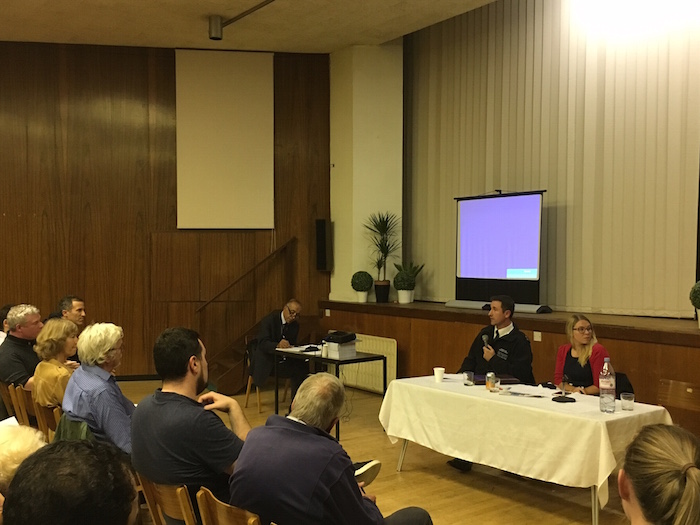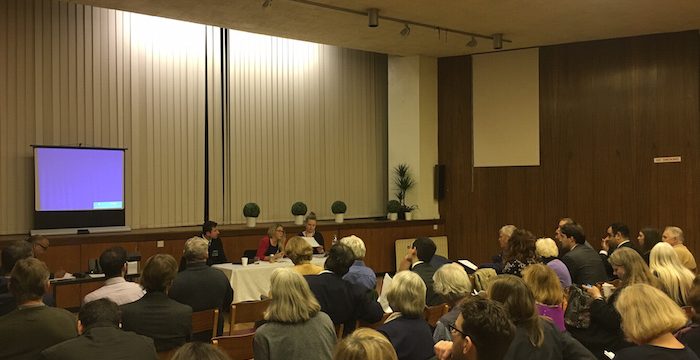Police “taken by surprise” by explosion in phone thefts
There was a good turnout at last night’s public meeting on moped-crime. It’s a hot topic that didn’t need any extra emphasis, but even as the meeting was taking place another moped-based phone snatch was happening taking place outside Finchley Road tube station.

Good turnout and good discussion – it’s a serious issue.
The first speaker, Judy Thomson, is a public safety officer from Camden, who spoke about how the council is trying to tackle the problem at its source by working with disaffected young people in the borough, although with fewer resources than they would like. This involves work on estates, working with the local police and sometimes involves CCTV camera. I had the impression that CCTV was rather cumbersome and limited given the scale of the problem.
Cllr Flick Rea asked about the ‘broken windows theory’, which suggests that something relatively minor like a rise in litter leads to low-level anti-social behavior which then leads to worse. Judy agreed and replied that they absolutely challenge unacceptable behaviour, for example, fly-tipping.
The second speaker was Inspector Richard Berns, who is in charge of neighbourhood policing in Camden. He’s only been in the post for six weeks, as has he has just transferred from Hammersmith and Fulham, before that he was at Harrow Road after seven years in Hackney. However, he knows West Hampstead well as apparently he had a paperround here 25 years ago!
He was refreshingly frank and said that that the problem had “exploded” and that the growth “has taken us a bit by surprise”. Worryingly, more thefts are getting violent – as the arrests earlier this week in Broomsleigh St following the fatal stabbing in Little Venice confirm.
Moped-enabled crime is a problem throughout central London, but Camden (with 4,147 incidents) and Islington (with 3,587 incidents) are the worst affected boroughs though – whatever our perception – the robberies are very much concentrated in the south of the borough. Earlier this year, Camden and Islington forces merged and given the scale of the problem, extra resources are being put behind the issue, with an additional two dedicated two officers bring the team (‘Operation Attrition’) up to thirty. Of course it is at the fore-front of every officer’s mind at the moment. Despite the rise in crime, we can still expect further cuts in police numbers, although Inspector Berns said “these would be due to natural wastage”.
One audience member asked if road checks would help contain the issue but Inspector Berns was skeptical, suggesting that the criminals would simply avoid them and drive away. The mopeds they use are stolen and are seen as being practically disposable by the criminals. Once they are stolen any identifying marks are filed down and number plates removed. Look out for mopeds with no number plates then.
There was some cynicism in the audience about whether it was even worth calling the police to report crime. One audience member, Simon Benson, was recently mugged, had his wallet stolen and – thanks to his driving licence (and address) being in his wallet, had his car stolen too. The police response was to close the file just 53 minutes after he reported the crime. Inspector Berns agreed this was very poor service, “It was just not good enough”.

Inspector Berns was frank and honest about the scale of the problem.
Berns also confessed that calling 101 – the non-emergency number – is “not very good at the moment” and he was unaware that it is not a free call (it costs 15p per call, the money goes to the telecom companies, not the government). He said that he thinks some crimes don’t get reported as members of the public give up. Another way of reporting low-level stuff was to tweet @Metcc, the Met’s contact centre (8am-10pm).
He dismissed the myth that the police are not allowed to chase suspects, although he clarified that it does depend on the severity of the crime. The stabbing this week was met with a heavy and successful response. He was also asked whether crimes were actually investigated or not and bluntly said, “If they solvable then we will, if not solvable we won’t”.
iPhone users are most at risk from theft – they account for two-thirds of stolen phones, and the problem could get worse with the iPhone X as this will retail for more than £1,000. Even with anti-theft technology the screen alone will be worth £400 so a stolen phone could be used for parts. There is however, no typical profile of a theft victim.
How can you protect yourself?
An obvious simple step is to listen out for the sound of mopeds approaching, they make a distinctive sound. If you see someone standing outside a station looking at their phone, remind them of the risk. Avoid using your phone in public as you walk along and could be vulnerable, and make sure your phone is backed up and secured.
Cllr Russell – herself a recent victim of a break-in – questioned Inspector Berns on local crime figures, which show an apparent year-on-year rise of 38% in Fortune Green and 28% in West Hampstead. Inspector Burns said this was inline with his figures that showed crime figures in Camden and Islington were up 28%, with a national increase of 13%. Nor are these just petty crimes, serious crime is also on the up – and Berns pointed out that for most of his career crime has fallen, so this is new territory for many in the police.
Odd then, perhaps, that the Safer Neighbourhood office on West End Lane will close, as the lease will not be renewed in 2019. But the teams will apparently be moving into West Hampstead police station on Fortune Green Road.
The evening ended with a good point from WHAT chair Mary Tucker, who reflected that TfL is removing ‘countdown’ displays from bus stops as people are now encouraged to check the times on their phones. In public, by the road. Just as we’re telling people to keep their phones hidden. This chimed with an earlier observation that the police and local authorities are looking at putting in bollards and street furniture on estates and alleyways to act as an obstruction, despite having just taken it away to ‘de-clutter’ the streetscape.
Inspector Berns confirmed that crime is on the rise. It is still, as Cllr Olszewski pointed out, relatively low but in our local area we have gone quickly from below the London average to being the average (and the average is rising). Last night was a well organised and well-chaired meeting. It was good to have councillors, the police, local residents all in one room because it is only by working together that we can tackle this. Inspector Berns was refreshingly honest and frank, and perhaps more importantly, came across as competent. He too was pleased with how the meeting went. Let us hope that some increased vigilance from locals and continued work by the police can bring this mini crime wave to an abrupt end.





Was this meeting recorded? I missed it. I would love to hear more as I am writing an article on this issue. Interested in talking to anyone who has experienced first hand moped-theft within the West Hampstead/Finchley Road area.